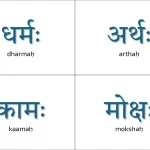The Vedas: The Ancient Hindu Scriptures.

Introduction to the Vedas
The Vedas hold a special place in the rich tapestry of Hinduism, acting as ancient Hindu scriptures that have shaped spiritual thought for thousands of years. These sacred texts are not just relics of history; they represent profound wisdom and knowledge that continue to resonate with millions today. Exploring the Vedas opens a doorway to understanding the core principles of life, spirituality, and the universe itself.
As we delve into this captivating world, we’ll uncover what defines these revered texts, their intricate teachings, and how they’ve influenced modern practices within Hinduism. The journey through the Vedas promises insights that reflect both ancient traditions and contemporary relevance—revealing why they remain essential to those seeking deeper meaning in their lives. Join us as we unravel the layers of Vedic knowledge and wisdom.
What are the Four Vedas?
The Four Vedas form the cornerstone of Vedic literature and ancient Hindu scriptures. Each text serves a unique purpose in the spiritual and cultural life of Hindus.
The Rigveda is the oldest, composed of hymns that honor various deities. It sets the tone for religious practices in early Hinduism.
Next is the Samaveda, primarily a collection of melodies and chants used during rituals. Its focus on sound emphasizes music’s role in worship.
Then comes the Yajurveda, which provides instructions for performing sacrifices. This text bridges knowledge with action, guiding practitioners through sacrificial rites.
There’s the Atharvaveda. Unlike its predecessors, it includes spells and incantations addressing everyday challenges alongside philosophical insights.
Together, these texts encapsulate a wealth of knowledge about spirituality, ritual practice, and philosophy within Hinduism.
Significance and History of the Vedas
The Vedas hold a revered place in the tapestry of ancient Hinduism. They are considered some of the oldest sacred texts, dating back over 3,000 years. These scriptures emerged during a time when oral traditions were dominant, capturing profound spiritual insights and practices.
Historically, the composition of the Vedas reflects the evolution of Indian society. They embody rituals, hymns, philosophy, and law that shaped early Hindu life. Each Veda was created by sages who channeled divine knowledge through meditation.
Their significance extends beyond mere religious texts; they are foundational to various aspects of culture — from art to architecture. The teachings within also inform modern ethical frameworks and social structures in India today.
As repositories of wisdom, they continue to influence countless generations with their timeless messages about unity between humanity and the cosmos.
Key Teachings and Philosophies in the Vedas
The Vedas are a treasure trove of ancient knowledge, offering profound insights into existence and the cosmos. Central to these scriptures is the concept of Dharma, which emphasizes duty and righteousness. This principle serves as a moral compass for individuals navigating life’s complexities.
Another significant teaching is the idea of Brahman, the ultimate reality that transcends individual deities. It encourages seekers to look beyond physical forms to understand oneness with all creation.
Moreover, the Vedas delve into concepts like Karma and Reincarnation, explaining how actions in this life shape future experiences. Such teachings stress accountability and ethical living.
Meditative practices outlined in the texts guide practitioners toward self-realization and inner peace. The Vedic emphasis on harmony—both within oneself and with nature—remains relevant today, calling for balance in modern lifestyles.
How the Vedas are Used in Modern Hinduism
The Vedas hold a revered place in modern Hinduism, serving as foundational texts that guide spiritual practices and rituals. Many Hindus chant verses from these ancient scriptures during ceremonies, invoking their sacred wisdom.
In contemporary settings, the teachings of the Vedas influence personal meditation and yoga practices. People seek to connect with their inner selves through techniques derived from Vedic principles.
Moreover, educational institutions across India incorporate Vedic studies into their curricula. This helps preserve ancient knowledge while promoting its relevance in today’s world.
Festivals often feature recitations and discussions on Vedic themes, fostering community engagement with these timeless texts. The emphasis on harmony and spirituality found within the Vedas continues to resonate deeply among practitioners of Hinduism today.
Controversies Surrounding the Interpretation of the Vedas
The interpretation of the Vedas has long been a subject of intense debate. Scholars and practitioners often find themselves at odds over their meanings and implications. This divergence is rooted in the complexity and depth of these ancient Hindu scriptures.
Various factions within Hinduism emphasize different aspects, leading to contrasting interpretations. For example, some focus on ritualistic elements while others highlight philosophical teachings. This can create tension among followers who are passionate about their beliefs.
Additionally, modern influences have sparked new perspectives on Vedic texts. Contemporary thinkers may challenge traditional views, advocating for more inclusive or egalitarian readings. Such shifts can provoke resistance from purists who hold tightly to established doctrines.
The impact of cultural context cannot be overlooked either; historical events shape how the Vedas are understood today. Often, this leads to conflicting narratives that complicate any singular understanding of these sacred writings.
Conclusion: The Timeless Wisdom of the Vedas
The Vedas remain a foundational pillar of Hinduism, embodying ancient wisdom that echoes through time. These sacred texts offer insights into rituals, ethics, and the nature of existence itself. Their relevance extends beyond religious practices; they provide a philosophical framework that encourages introspection and understanding.
As Vedic knowledge continues to influence modern thought, it invites seekers from all walks of life to explore spirituality in diverse ways. The teachings encapsulated within the Four Vedas foster connections between individuals and the universe while promoting harmony among communities.
Despite ongoing debates about interpretation and meaning, the importance of the Vedas is undeniable. They serve as a reminder that wisdom can transcend eras and cultures. By delving into these ancient scriptures, one uncovers not just historical context but also profound truths applicable today.
Engaging with the Vedas opens doors to spiritual growth and exploration. Their timeless messages resonate with anyone on a journey toward greater understanding—making them invaluable treasures in our evolving world.










